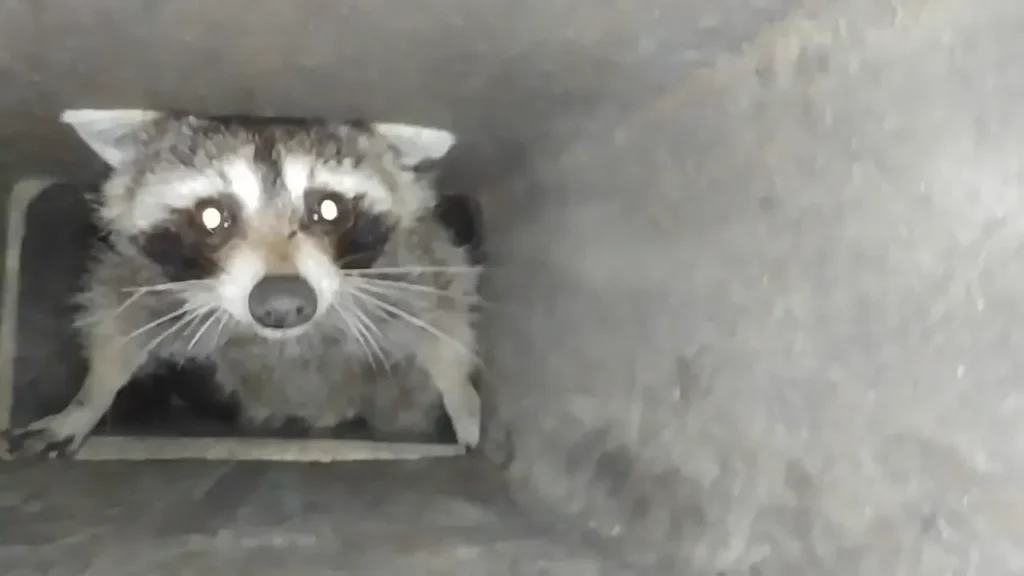Raccoons often find their way into chimneys, even bypassing specialized caps designed to deter them.
If you notice a cap displaced, it’s a sign of raccoon activity. Listen for sounds like chattering, scratching, or rustling from your chimney flue, indicating an infestation.
Spotting raccoons on your rooftop or in the chimney is also a red flag.
Raccoons can also cause structural damage, tearing shingles and fascia boards and potentially causing leaks.
They create noise, including squeaking and rustling, especially when raising their young.
Beyond structural issues, raccoons carry diseases like rabies and host smaller pests like fleas, ticks, and lice.
Their droppings may contain the dangerous raccoon roundworm. Swift action is crucial to protect your property and health, and here’s how to do that.
Ensuring a Safe Removal of Raccoons from Your Chimney

Here are some steps to safely evict raccoons from your chimney:
1. Identify the Problem
If you start hearing unusual noises emanating from your chimney, it’s quite likely that raccoons have made it their temporary home.
Additionally, you might observe a distinct and often unpleasant odor lingering in the vicinity, coupled with the presence of debris and twigs around the chimney.
These signs collectively indicate that raccoons could be inhabiting your chimney, necessitating prompt attention to safely and humanely address the situation.
2. Check for Babies
If you have reason to believe that there might be baby raccoons inside your chimney, it’s crucial to exercise patience and caution.
Waiting until the young raccoons are old enough to leave on their own, typically with their mother, is essential.
Removing only the adult female raccoon without ensuring the safety of the babies can result in the juveniles being left trapped and extremely vulnerable.
By waiting for the appropriate time, you can help ensure the welfare of all the raccoons involved in the process.
3. Use Repellents
To encourage raccoons to vacate your chimney, various repellents and frightening techniques can be employed.
One effective approach is to place items with strong odors, such as vinegar, moth flakes, or specialized raccoon eviction fluid, above the damper.
These scents can be particularly effective in motivating the raccoons to seek alternative shelter outside your chimney.
By applying these methods strategically and responsibly, you can facilitate a safe and humane departure for these animals while safeguarding your property.
4. Install a Chimney Cap
After successfully evicting the raccoons from your chimney, it’s imperative to take preventive measures to ensure they don’t return.
Engage a professional chimney sweep to remove any lingering debris and install a chimney cap.
This protective barrier acts as a deterrent, effectively preventing other raccoons from moving in and establishing residence in your chimney.
By implementing these proactive steps, you can maintain a raccoon-free and secure chimney for the long term.
5. Keep Pets Inside
Throughout the eviction process, it’s essential to prioritize the safety of your pets. Mother raccoons can be protective, and they might not relocate their offspring if they perceive potential threats from other animals, including pets.
By keeping your pets indoors and away from the vicinity, you can help minimize stress for both the raccoons and your domestic animals, ensuring a safer and more controlled resolution to the situation.
6. Consider Professional Help
If you find yourself uncomfortable with the idea of evicting raccoons on your own or if the situation seems particularly severe, it’s advisable to explore the option of hiring a professional wildlife removal service.
These experts possess the necessary knowledge, experience, and equipment to handle raccoon evictions safely and efficiently.
Entrusting the task to professionals can ensure the humane removal of raccoons while also mitigating any risks or complications associated with DIY efforts. This approach offers a practical and responsible solution when dealing with raccoon infestations.
For more information you can consult our full guide on ‘How to get rid of Raccoons.’
To Conclude
The expense associated with raccoon removal from your chimney can fluctuate, contingent on factors such as the extent of the infestation and the geographic location of your residence.
On average, as reported by Fixr, the cost hovers around $400. However, it’s essential to note that this figure can deviate significantly based on the specific circumstances.
For instance, a more extensive or complex raccoon problem may incur higher costs, while the prices might differ from one region to another.
Thus, it’s advisable to obtain quotes from local wildlife removal professionals to gain a precise estimate tailored to your unique situation and location.

